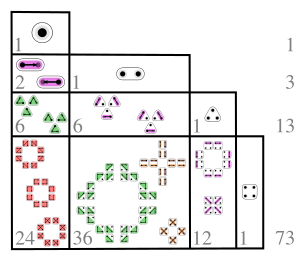
In mathematics, the (signed and unsigned) Lah numbers are coefficients expressing rising factorials in terms of falling factorials and vice versa. They were discovered by Ivo Lah in 1954.[1][2] Explicitly, the unsigned Lah numbers are given by the formula involving the binomial coefficient
for .
Unsigned Lah numbers have an interesting meaning in combinatorics: they count the number of ways a set of elements can be partitioned into nonempty linearly ordered subsets.[3] Lah numbers are related to Stirling numbers.[4]
For , the Lah number is equal to the factorial in the interpretation above, the only partition of into 1 set can have its set ordered in 6 ways: is equal to 6, because there are six partitions of into two ordered parts: is always 1 because the only way to partition into non-empty subsets results in subsets of size 1, that can only be permuted in one way. In the more recent literature,[5][6] Karamata–Knuth style notation has taken over. Lah numbers are now often written as
- ^ Lah, Ivo (1954). "A new kind of numbers and its application in the actuarial mathematics". Boletim do Instituto dos Actuários Portugueses. 9: 7–15.
- ^ John Riordan, Introduction to Combinatorial Analysis, Princeton University Press (1958, reissue 1980) ISBN 978-0-691-02365-6 (reprinted again in 2002 by Dover Publications).
- ^ Petkovsek, Marko; Pisanski, Tomaz (Fall 2007). "Combinatorial Interpretation of Unsigned Stirling and Lah Numbers". Pi Mu Epsilon Journal. 12 (7): 417–424. JSTOR 24340704.
- ^ Comtet, Louis (1974). Advanced Combinatorics. Dordrecht, Holland: Reidel. p. 156. ISBN 9789027703804.
- ^ Shattuck, Mark (2014). "Generalized r-Lah numbers". arXiv:1412.8721 [math.CO].
- ^ Nyul, Gábor; Rácz, Gabriella (2015-10-06). "The r-Lah numbers". Discrete Mathematics. Seventh Czech-Slovak International Symposium on Graph Theory, Combinatorics, Algorithms and Applications, Košice 2013. 338 (10): 1660–1666. doi:10.1016/j.disc.2014.03.029. hdl:2437/213886. ISSN 0012-365X.















